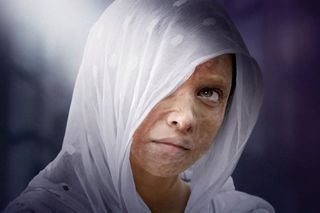
‘Chhapaak’ Avoids Trauma Porn, Focuses on Legal Nightmare for Survivors
Director Meghna Gulzar delivers a sensitive depiction of a survivor attempting to move on despite a painfully slow justice system.

In Meghna Gulzar’s Chhapaak, an ecstatic Malti (Deepika Padukone) throws a party, complete with dancing and cake, to celebrate a judicial victory: a judge had ruled acid attacks must be recognized as a significant crime in their own right, non-bailable, with imprisonment involving a minimum of 10 years. Amol (Vikrant Massey), founder of the NGO where Maltiworks, returns and berates her for celebrating while the fight to end acid attacks completely would still to be long and arduous. She tells him, “Sometimes, you act as if people threw acid upon your face. They didn’t. They threw it upon mine.”
Such is Malti’s journey in Chhapaak, which depicts a woman caught in a relentless tug of war with her identity as a survivor of an acid attack, and her equally valuable desire to implant joy within her life, to be her own self, and to move on within a world that never fails to remind her of her identity as a survivor. Gulzar takes immense advantage of fiction’s malleability and delivers a fascinating lead character — level-headed, tip-toeing between quiet stoicism and infectious joy — who navigates both the personal and the political as a woman whose sense of self was stolen and twisted into something she never fathomed, with no real explanation for why.
The crux and the strength of the film, however, is its ability to both focus on Malti’s life and rise beyond it to present the dull horror of the onerous, sluggish Indian judiciary system. Survivors of violent, gendered crimes in India are well aware of the arduous, time-consuming path towards justice, which has also been a strong deterrent from reporting such crimes. Chhapaak showcases the reasons why survivors don’t report, minus sensationalization: a policewoman asks Malti’s parents why her phone is littered with boys’ numbers; an old boyfriend refuses to testify in Malti’s favor in the court and pretends they were just “friends,”even after giving the police the opposite statement; an insensitive journalist asks Malti why she faced an attack from a perpetrator whom she knew and if she has any plans to marry. Such instances both delay the path towards justice and deviate energies from the survivor’s struggle to irrelevant whataboutery.
Throughout all this, Malti’s case against Basheer (Vishal Dahiya), the man who masterminds the acid attack against her, drags on for years. Basheer also receives multiple bails, even with solid evidence against him and the intent to harm established. Besides her own case, Malti also files a public interest litigation (PIL) aimed at banning acid sales within the country, which is also repeatedly delayed over years due to bureaucratic minutiae and non-attendance of the legislators necessary to move the case forward.
Related on The Swaddle:
What It Will Take to End Gang Rapes in India
Malti’s lawyer, Archana Bajaj (Madhurjeet Sarghi), recognizes the drudgery of the legal system and the toll it takes on her client. She motivates Malti — then a 19-year-old girl — with constant reminders of how she must continue to fight; as Malti suffers and shuts herself away, her perpetrator marries and has a child. While this seems to motivate Malti, the method’s revenge undertones don’t come across as the healthiest motivator or coping mechanism for a survivor. This is also where Chhapaak falters significantly: Malti’s trauma is depicted as a bunch of forced, hackneyed extremes, leaving the audience to only understand that she knows the world finds her grotesque, without appreciating how she processes the horror inflicted upon her. Thus, in the second half, when Malti stands outside the operation theatre of a recently dead acid attack victim and voices how she is jealous, how she wishes she could’ve died too, the scene translates as a beautiful in its own merit, but abrupt and odd in a film that cannot spare bandwidth for the nuances of her mental trauma.
However, this is a Bollywood feature film. Chhapaak opts for a rare eschewing of trauma porn, which is a delight considering how Bollywood movies often use grotesque depictions of women’s trauma as a character-, violence- and rage-building exercise for their male leads. The scenes depicting the assault are jarring, but without significant reliance on gore, except for a grating, melodramatic soundtrack that irritates more than allows the audience to empathize.
Intersectional themes also hold significant space in Chhapaak, with a subplot involving a survivor from a marginalized caste, who suffers an acid attack from an upper-caste man and is denied help because of her caste identity. Malti’s own class position is brought into the fray in a subtler manner when her mother tells her that PILs and trials are for ‘big people’ (people with means), which leads Malti to tell her lawyer that court trials and communicating with the media aren’t for people ‘like her.’ Not only does Chhapaak ensure the audience gets a wholesome view of survivors’ lives across traumas, but it also shows what faction of women — those from socio-economically disadvantaged classes and castes — are targeted most often by gendered violence, such as acid attacks.
Through its two-hour run-time, Chhapaak remains an arresting watch, laying out the bare bones of a survivor’s fight to move on and find justice. The film stands on the power of the story, minus any frills. Perhaps, and hopefully, this might even set a precedent within Bollywood for more sensitive, dignified attempts at depicting violence against women on film.
Aditi Murti is a culture writer at The Swaddle. Previously, she worked as a freelance journalist focused on gender and cities. Find her on social media @aditimurti.
Related


Where Is Male Baldness in Anti‑Beauty Norm Movements?
